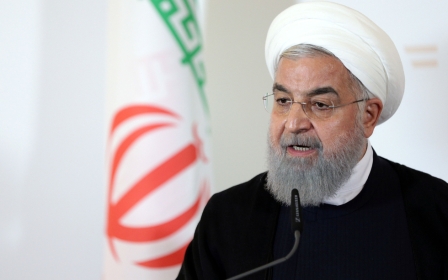Nuclear deal: Iran is suing the US for imposing sanctions
Iran has filed a lawsuit against the United States stating that Washington's decision in May to impose sanctions after pulling out of a nuclear deal violates a 1955 treaty between the two countries, the International Court of Justice said on Tuesday.
A State Department official said the application was without merit and the United States would fight it in the court.
"While we cannot comment on the specifics, Iran's application is baseless and we intend to vigorously defend the United States before the ICJ," a State Department official, who spoke on condition of anonymity, told Reuters.
President Donald Trump withdrew the United States from the 2015 nuclear pact with Iran reached by his predecessor Barack Obama and other world powers, and ordered tough US sanctions on Tehran.
The deal saw Tehran drastically scale back its nuclear programme in exchange for lifting sanctions.
The ICJ, which is based in The Hague and is also known as the World Court, is the United Nations tribunal for resolving international disputes. Iran's filing asks the ICJ to order the United States to provisionally lift its sanctions ahead of more detailed arguments.
"Iran is committed to the rule of law in the face of US contempt for diplomacy and legal obligations," Iranian Foreign Minister Mohammad Javad Zarif said in a tweet on Monday, referring to Tehran's lawsuit at the ICJ.
Iran said in its filing that Trump's move "has violated and continued to violate multiple provisions" of the Treaty of Amity, Economic Relations and Consular Rights, signed long before the 1979 Islamic Revolution that ousted the US-allied shah and triggered decades of hostile relations with Washington.
In a lawsuit filed by Iran in 2016 based on the same 1955 treaty, Washington argued that the ICJ had no jurisdiction. The court scheduled hearings in that case in October.
The next step in Iran's new lawsuit will be a hearing in which the United States is likely to contest whether it merits a provisional ruling. The court has not yet set a date.
Although the ICJ is the highest United Nations court and its decisions are binding, it has no power to enforce them, and countries - including the United States - have occasionally ignored them.
The spectre of new US sanctions, particularly those meant to block oil exports that are the lifeline of Iran's economy, has caused a rapid fall in the Iranian currency and triggered street protests over fears that economic hardships will soon worsen.
Stay informed with MEE's newsletters
Sign up to get the latest alerts, insights and analysis, starting with Turkey Unpacked
Middle East Eye delivers independent and unrivalled coverage and analysis of the Middle East, North Africa and beyond. To learn more about republishing this content and the associated fees, please fill out this form. More about MEE can be found here.




